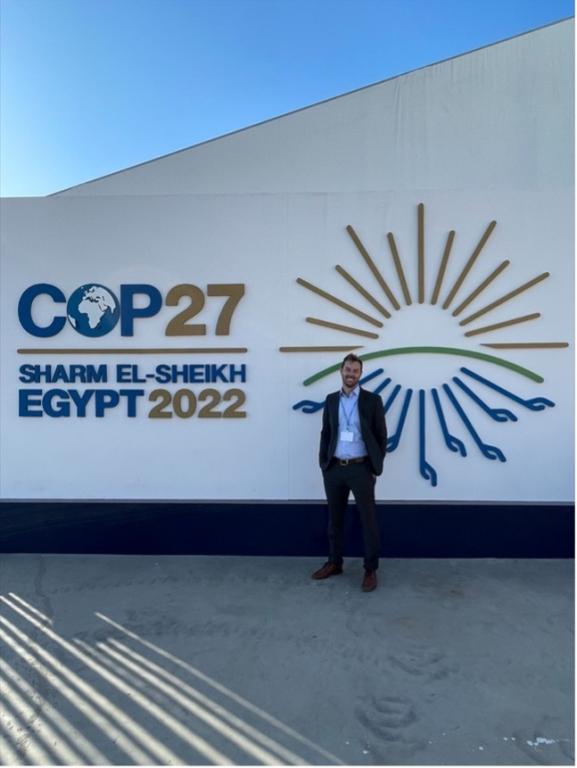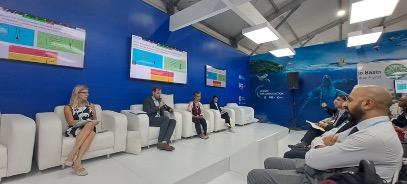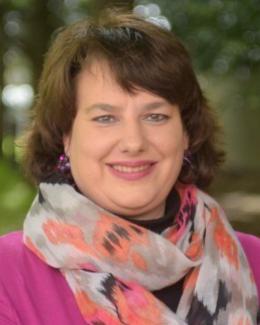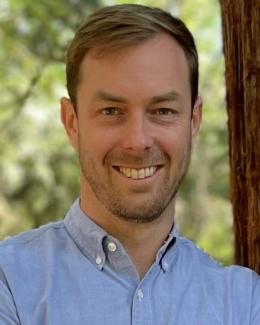
David McCollum, a senior scientist at the Department of Energy’s Oak Ridge National Laboratory and lead for the lab’s contributions to the Net Zero World Initiative, was one of more than 35,000 attendees in Egypt at the November 2022 Sharm El-Sheikh United Nations Framework Convention on Climate Change, or UNFCCC, Conference of the Parties, also known as COP27.
McCollum served as a panelist, moderator and presenter on behalf of ORNL and the IPCC, or Intergovernmental Panel on Climate Change, sharing information and insights on mitigating climate change through demand-side responses and general pathways towards a net-zero emissions society.
Now in its 27th year, the Conference of the Parties is a two-week annual event full of intergovernmental negotiations and press conferences. More than 100 heads of state and other government representatives were in attendance. Beyond the official government activities, the conference includes side events spread across dozens of pavilions showcasing climate change research, climate-relevant technologies and climate action around the world and across different sectors. Thousands of non-governmental representatives, including researchers, participate in conference activities.
This year’s conference concluded on November 20 with a historic decision to establish and operationalize a loss and damage fund for vulnerable countries hit hard by climate disasters.
McCollum shared the following observations and key takeaways from his attendance during the first week of COP27, including how participation in such events benefits the global reach and impact of ORNL and DOE.
Is this the first time you have attended the UNFCC COP Conference?
In 2018, I attended COP24 in Poland. At the time, I was working in Europe at the International Institute for Applied Systems Analysis in Austria and gave a presentation at one of the side events.
Can anyone attend, or is it by invitation only?
You don’t need an invitation to attend, per se. Essentially anybody can go. The constraint is getting a registration badge from an observer organization. This year, for example, I went with another organization’s observer badge, the IPCC, because I helped organize some sessions, moderated one session, and presented at another. I was the only ORNL-affiliated attendee this year at COP, although others have attended in years past. Ideally more colleagues will have the opportunity to attend in the future. With much appreciated support from several colleagues at ORNL, including my associate laboratory director, Xin Sun, and colleagues in the Laboratory Director’s Office, the research library and elsewhere, I applied for ORNL to become an observer organization of the conference starting next year.
What is it like being there, among more than 35,000 climate experts from around the world?
It’s a unique environment, to say the least. Huge crowds were roaming around a sprawling conference center complex; a swarm of activity was all around. An area called the blue zone is where all the side events take place. That part has the feeling of a trade show or an expo with giant concourses filled with rows and rows of stylishly designed pavilions crammed up against each other. Each has a stage for panel discussions as well as space for audiences of different sizes – on the order of tens to hundreds. It’s loud, as there is a lot going on at any one moment. Yet, somehow, in each pavilion, deep and thoughtful discussions are taking place on very important topics.

Credit: Minal Pathak
Then, separate from the side events is the zone where all the official government negotiations take place. Non-government observers, like myself, can sit in on some of those meetings, but not all. What’s also special is how incredibly diverse the conference is, with people coming from all corners of the globe and all walks of life – government, private industry, research and academia, non-government observers, advocacy groups, faith-based organizations, indigenous groups and more.
When you presented on behalf of the IPCC, what information did you share?
I shared results from IPCC AR6 related to different climate change scenarios that could inform and guide the global energy systems transformation. I was previously an author on the Working Group III contribution to the IPCC’s Sixth Assessment Report, and I still serve on the WG III Technical Support Unit, which is based at Imperial College London. Working Group III focuses on climate change mitigation: assessing the scientific literature and sharing methods for reducing greenhouse gas emissions and removing them from the atmosphere.
What does it mean for a national lab to participate in this conference, and what’s the benefit to you as a researcher?
I would say there are three key benefits: visibility, networking and keeping up with the latest thinking in the field. First, it’s important for the national labs to have a seat at what is one of the biggest, most diverse tables on the planet. The annually occurring government negotiations catalyze all kinds of side discussions on every climate change and sustainability topic you can think of. All the players are there, big and small. And, therefore, it’s good for ORNL and other national labs to be there to showcase the fantastic work we're doing in these spaces.
Because so many colleagues from all over the world are in attendance, clearing their schedules to be mentally and physically present, it’s a unique opportunity to schedule productive bilateral meetings on ongoing and potential future projects. There’s also the opportunity to meet many new colleagues – in other words, it’s great for networking. From these conversations as well as from the official government negotiations, one absorbs a huge amount of information over a short timeframe. Things you might not pick up from reading the news or a journal paper. And that’s critical for staying on the leading edge of the science-society discourse.
Did you have the opportunity to meet any personal heroes?
I did have several interactions with people I deeply admire and respect. For example, one person I was fortunate to meet with was Professor Jeff Sachs from Columbia University, a renowned climate and environmental economist who has been very influential in U.S. and international policy and economics discussions for decades. We had a working meeting regarding some of the Net Zero World activities. We are planning to partner together – his Sustainable Development Solutions Network and our Net Zero World Initiative labs – combining forces to amplify our mutual objectives. Professor Sachs was influential a few years ago in helping the United Nations to establish the Sustainable Development Goals. I would consider him somebody who I've looked up to for many years as helping to advance the global discourse.
Any additional notable conference conversations?
I also interacted with a few of the many students who were there. For example, one day when I was outside waiting in line for a sandwich, I had the pleasure of meeting some undergraduates from the University of California, Berkeley, and from a university in Dubai. Just in those brief discussions, I learned a lot about their perspectives on COP27 and on climate change more generally. The youth movement is strong, and they were present in large numbers at the conference. It was good to see and feel their passion and excitement. They recognize the seriousness of the situation and how important the multilateral government negotiations have become.
Besides getting to interact with mentors, what else did you enjoy?
More so this year, we saw U.S. policymakers from both sides of the aisle engaging in side-event panel discussions. They were sharing their viewpoints and having constructive conversations with each other and with their counterparts from other countries. I found it particularly interesting to see these “celebrities” up close and personal, often without an entourage of bodyguards. They were like anybody else.
What are some takeaways that could be applied toward advancing decarbonization research goals?
I think there's only opportunity for us to do more at ORNL. For instance, we could organize side events at future COPs, perhaps partnering with other national labs or organizations on a topic where we have a lot to say, like bioenergy or electric vehicles. The conversations at COP really benefit from scientific underpinning, and this is something we at ORNL can provide in ample quantities. I think there’s space for us to do much more of that, not just at COP but here in our backyard as well. It requires skill and practice to package research in ways fit for consumption by non-scientific audiences. But I know from my time at ORNL that there are many people here who would like to move more into that space and would appreciate more opportunities to do that.
What is one final thought on your COP27 experience?
I returned with the recognition, perhaps even more than before, that it's not enough for researchers to simply develop great science and amazing technologies and then throw them over the fence, hoping they get taken up by the wider world. You really must get out there and spread the word. Whether you’re talking on the floor of the United Nations or in the hallways of your local community organizations – it’s about communicating your science to society and then taking in learnings that help improve your science the next time around.
UT-Battelle manages ORNL for the Department of Energy’s Office of Science, the single largest supporter of basic research in the physical sciences in the United States. The Office of Science is working to address some of the most pressing challenges of our time. For more information, please visit energy.gov/science.



